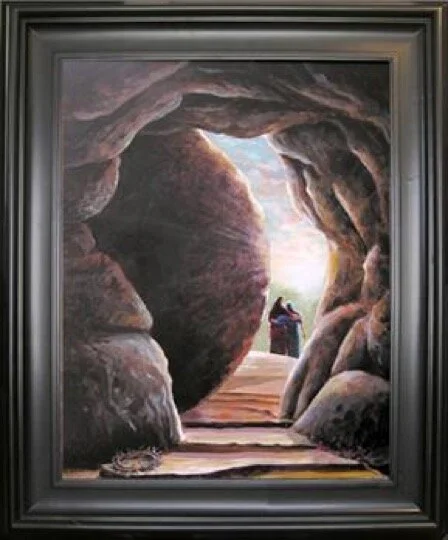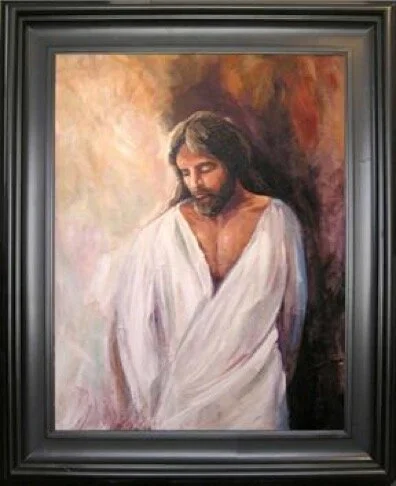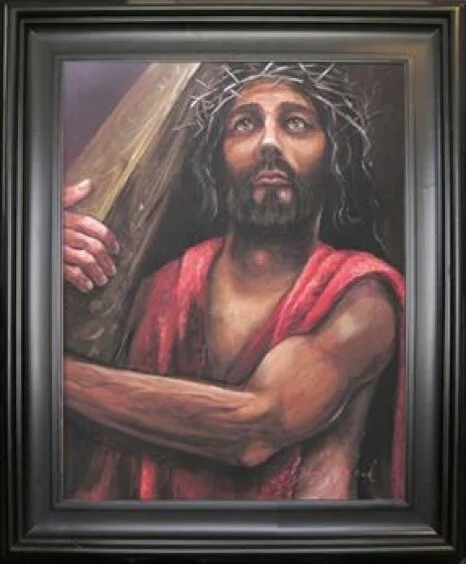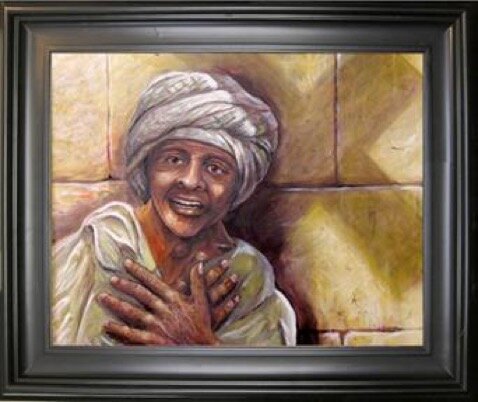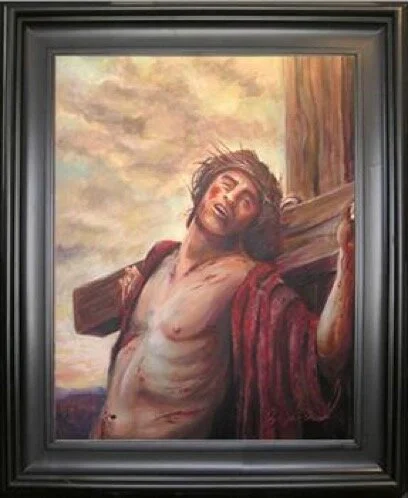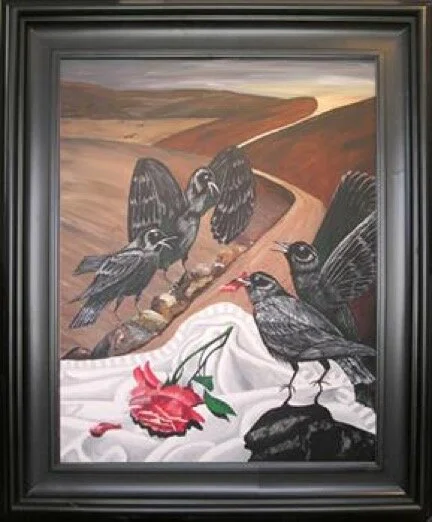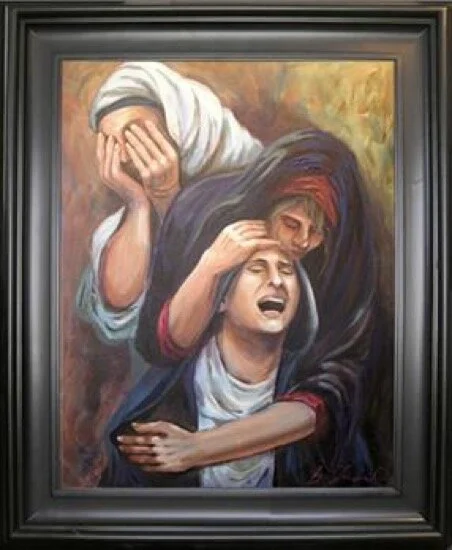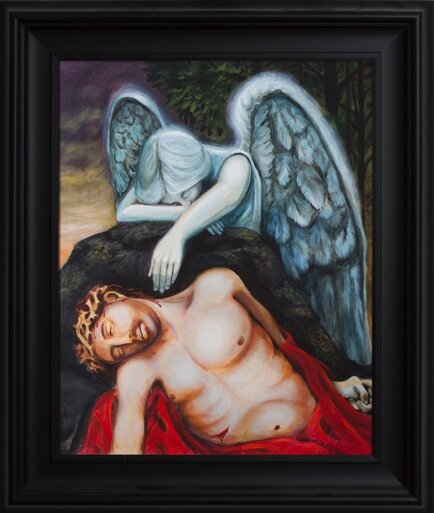Welcome to the Guided Meditation for Holy Week
This guide will help you navigate through nine stations throughout the church. This meditation will give you an intimate look at the last hours of Jesus’ life. You are invited to gather some items which may help with your meditation:
Each station: your Bible and a candle (or 9 candles, to be extinguished as you complete each station)
Station 1: a small bag of coins and a small table, which you could overturn (this takes some courage)
Station 2: a plant to represent the Garden of Gethsemane
Station 3: sharp wire or sticks, to represent the Crown of Thorns and a piece of purple cloth
Station 4: a cross you can lift
Station 5: a hammer, nails, small scrap of wood
Station 6: a pair of dice
Station 7: a place to kneel
Station 8: a Bible turned to Psalm 22
Station 9: a length of white or linen cloth, a small amount of oil (as if for anointing)
The artwork for each station was painted by my beloved friend, Bobby Strickland, for Saint Mark United Methodist Church in 2008. These paintings were commissioned by the Director of Fine Arts, Jane Burke, and have been a blessing to so many through the years.
****************************************************************************************************************
We are busy people, and these are busy times, and so we’re glad that you’re here and that you’ve taken the time to be in this sacred space.
We are going on a journey today, and at each station, you will encounter a text which describes what Jesus did during Holy Week. As you make your way along the path, we invite you to reflect on the texts. As you leave the tomb—the final place in our journey today—you will have opportunities to think about how the text might affect you in the here and now. What does the text mean for the Christian life today? What does it mean for your life?
Keep in mind that we live in a world where time is based on linear-thinking. We know of life as past, present and future. But, the God of all, who created us to live in this world, is not bound by time. So, the events of Holy Week are not bound by history. The events of Holy Week recur each year as if they are happening all over again.
There’s no need to rush. The goal is to think about the text as if for the first time and then to think about its meaning for your life today. It requires listening with new ears and seeing with new eyes. So, take as much time as you need, and give others the time and space they need as well.
Breathe deeply. Relax. It’s okay to go slowly and let your mind wander.
Our journey begins with Monday of Holy Week, on the day following Palm Sunday. In our first text, commonly referred to as the cleansing of the temple, Jesus enters the temple courtyard, and, seeing the business going on there, begins to drive out those who were buying and selling and he overturns the tables of the moneychangers. He interrupts the temple activity because it had become a substitute for the activity of justice and righteousness which God commands.
What Jesus did in the cleansing of the Temple was an interruption. An interruption of the normal, day-to-day way of doing things. It might have been a Holy interruption, but it was an interruption nonetheless.
An interruption…
Keep that word in mind as you begin. It will be important. Interruption. When you feel ready, you may enter the courtyard, and, as you make your way to the first stop, remember that this is a Sacred Space and a Sacred Time.
Blessings on your journey.
Station One: Jesus Cleanses the Temple
Then they came to Jerusalem. And he entered the temple and began to drive out those who were selling and those who were buying in the temple, and he overturned the tables of the money changers and the seats of those who sold doves; and he would not allow anyone to carry anything through t he temple. He was teaching and saying, “Is it not written, ‘My house shall be called a house of prayer for all nations?’
But you have made it a den of robbers!”
And when the chief priests and the scribes heard it, they kept looking for a way to kill him; for they were afraid of him, because the whole crowd was spellbound by his teaching. And when the evening came, Jesus and his disciples went out of the city.
- Mark 11:15-19
If you wish, close your eyes and imagine this scene:
...Business as usual… then t he violence of Jesus’ anger… the shock of the onlookers…Pause with the scene for a moment, and let it unfold in your imagination.
What in our world,
The church,
Your own life
Makes Christ this angry now?
Invite God into the place where you hold these thoughts, images and feelings in your heart. This is your chance to give these things over to God, and let God be angry with you, for you. Wherever you are, I invite you to “overturn” the tables of the things that have set up camp in your lives and hearts. Smash them, break them, let them go. Watch as the good intentions that have turned into bad habits & misguided actions are turned on their heads.
When you are ready, continue reading.
JESUS PRAYS IN GETHSEMANE, BOBBY STRICKLAND
Station Two: Jesus Prays in Gethsemane
They went to a place called Gethsemane; and he said to his disciples, “Sit here while I pray.” He took with him Peter and James and John, and began to be distressed and agitated. And he said to them, “I am deeply grieved, even to death; remain here, and keep awake.” And, going a little farther, he threw himself on the ground and prayed that, if it were possible, the hour might pass from him. He said, “ Abba, Father, for you all things are possible; remove this cup from me; yet, not what I want, but what you want.”
He came and found them sleeping; and he said to Peter, “Simon, are you asleep? Could you not keep awake one hour? Keep awake and pray that you may not come into the time of trial; the spirit indeed is willing, but the flesh is weak.”
And again, he went away and prayed, saying the same words. And once more, he came and found them sleeping, for their eyes were very heavy; and they did not know what to say to him. He came a third time and said to them, “Are you still sleeping and taking your rest? Enough! The hour has come; the Son of Man is betrayed into the hands of sinners. Get up, let us be going. See, my betrayer is at hand.” - Mark 14:32-42
Jesus came to the garden to pray. Here, in this quiet space, we invite you to focus on the painting of Christ. Look at his expression. What do you see?
As you read the scripture, how does it make you feel to know that Jesus was distressed… agitated?
What is he asking of the disciples? Why can’t they seem to do it?
How does it make you feel, that Jesus prayed for the hour to pass from him?
Let this be your prayer, as you sit and contemplate:
“Abba, Father, for you all things are possible; remove this cup from me; yet, not what I want, but what you want.”
When you are ready, continue reading.
Jesus Carrying the Cross, Bobby Strickland
Station Three: To Mock Your Reign,
O Dearest Lord
Then the soldiers led him into the courtyard of the palace; and they called together the whole cohort. And they clothed him in a purple cloak; and after twisting some thorns into a crown, they put it on him. And they began saluting him, “Hail, King of the Jews!” They struck his head with a reed, spat upon him, and knelt down in homage to him. After mocking him, they stripped him of the purple cloak and put his own clothes on him. Then they led him out to crucify him.—Mark 15:16-20
Here, you will find scraps of purple cloth, and a crown of thorns. I invite you to touch the thorns, to feel how sharp they are, and to run your hands over the soft fabric.
The actions of the soldiers were humiliating and scornful, and yet, during this Holy Week, the mocking and derision still pointed to the truth of the Gospel: that Jesus is the King of the Jews, the Lord of Life, the Son of God and the Son of Man.
What do you find that you mock or deride in your own life? A person? A relationship? A job? Consider why you have such deep feelings, and seek to discover why. Are you afraid, of love? Of success? Of failure?
We mock what we desire, and what we desire most is to be loved. Yet, to receive love is often the most challenging thing for us. So, we hurt Love. We hold it at a distance. We scorn it and question it and wait for Love to leave.
Jesus came that we may know the fullness of God’s love. Like the soldiers, we deny that Love because it is too powerful, too mysterious, too overwhelming. We flood our minds with doubt. We place a thorny crown on the head of that which we most desire. But, for God, nothing that we do will separate us from God’s love. As you sit, open yourself to the possibility that God’s love does not have to be scorned or mocked, but can be accepted.
When you are ready, continue reading.
Simon of Cyrene, Bobby Strickland
Station Four: Take up Thy Cross, and Follow Me
The soldiers compelled a passer-by, who was coming in from the country, to carry his cross. It was Simon of Cyrene, the father of Alexander and Rufus . —Mark 15:21
We know little of Simon of Cyrene, except that he was the one chosen to carry the cross for Jesus.
He was willing. Able. Weighted down.
Here, you will find the cross that we use on Sunday mornings. If you are able, I ask you to lift it up out of its stand. Feel the weight in your hands, watch how it pulls you forward, and the force of gravity makes you want to put it down.
As you feel the heaviness of this cross, consider the weight of the cross upon which Christ was crucified. It was massive, made of hewn logs that weren’t hollowed or sanded. Not only was it heavy, it was also rough and abrasive.
When you are called by Jesus to take up your cross, what do you imagine lifting? What, in your life, is so heavy and burdensome that you crave and desire help to carry it?
Who in your life might need help with their cross? Is there someone who is struggling that could use your strength and comfort?
Now: Consider what sort of “cross” Jesus is calling you to carry as you follow him. What makes being a Christian hard for you? What do you struggle with most?
As you consider the cross, ask Jesus where you are being led. Consider picking up your burden and following where Christ is calling you to go.
When you are ready, continue reading.
Christ is Crucified, Bobby Strickland
Station Five:
Were You There When They Crucified My Lord?
A great number of the people followed him, and among them were women who were beating their breasts and wailing for him. But Jesus turned to them and said, ‘Daughters of Jerusalem, do not weep for me, but weep for yourselves and for your children. For the days are surely coming when they will say, “Blessed are the barren, and the wombs that never bore, and the breasts that never nursed.”
Then they will begin to say to the mountains, “Fall on us”; and to the hills, “Cover us.” For if they do this when the wood is green, what will happen when it is dry?’ Two others also, who were criminals, were led away to be put to death with him. When they came to Golgotha, the place that is called The Skull, they crucified Jesus* there with the criminals, one on his right and one on his left. Then Jesus said, ‘Father, forgive them; for they do not know what they are doing.’—Luke 23:27-34
“And they crucified Jesus there with the criminals.”
It’s horrible. These eight words contain the greatest sin that humankind ever committed. We crucified Jesus, the Son of God, our Savior… the embodiment of love.
Here, you will find a hammer and nails. You are invited to hammer a nail, carefully, into the wood that’s available. Hear the ring of the hammer. The echo of its force.
What have we done, O Lord?
And yet, Jesus’ first words are, “Father, forgive them;
for they know not what they are doing.”
Pray for forgiveness for the things in your life that you find most unforgiveable.
God is willing, if we but ask.
Take a moment to read James Weldon Johnson’s powerful poem: The Crucifixion.
When you are ready, continue reading.
Casting Lots, Bobby Strickland
Station Six: Casting Lots
When the soldiers had crucified Jesus, they took his clothes and divided them into four parts, one for each soldier. They also took his tunic; now the tunic was seamless, woven in one piece from the top. So they said to one another, ‘Let us not tear it, but cast lots for it to see who will get it.’ This was to fulfill what the scripture says,
‘They divided my clothes among themselves,
for my clothing they cast.’
And that is what the soldiers did.
—John 19:23-25a
Before Jesus died,
the soldiers took charge
and led him out,
“just politics,”
they said.
And suddenly they were there
the skull
the horrid mount
stripped,
naked,
he refused the anesthesia and was pounded into wood.
Gambling, laughing,
cursing, mocking,
weeping, hoping,
praying -
a casino at the cross.
-Brother Maria Anthony Serval
As you read the poem above, hold the dice in your hands. Roll them around.
A Casino at the Cross…
What do we gamble on today?
We take things that are so trivial, and give them power and value when they have none. A tunic. A simple tunic, gambled away by the soldiers at the foot of the cross.
This is your chance to take away the power that you’ve given to arbitrary things. To set down the dice, and refuse to gamble for something that means nothing. We don’t have to take chances with God. We’ve done our worst, and we’re still loved and forgiven.
When you are ready, continue reading.
Women Weeping at the Cross, Bobby Strickland
Station Seven: Woman, Behold your Son
Meanwhile, standing near the cross of Jesus were his mother, and his mother’s sister, Mary the wife of Clopas, and Mary Magdalene. When Jesus saw his mother and the disciple whom he loved standing beside her, he said to his mother, ‘Woman, here is your son.’ Then he said to the disciple, ‘Here is your mother.’ And from that hour the disciple took her into his own home. —John 19:25b-27
Jesus has always pushed us to reconsider everything we hold dear—institutions, possessions, now, our family systems.
Jesus says to his weeping mother, who birthed him, nursed him, fled with him, fed him, taught him, rejoiced with him, lost him and found him… “Woman, here is your son.”
He knows that she is looking at her own flesh and blood in its most vulnerable state. As an infant, she washed his feet, belly, chest and head. She knows him intimately. And here, for all the world to see, is her son, naked and dying. Bleeding and wounded. Broken.
It’s a heartbreaking scene. But, Jesus says to the disciple with her, “Here is your mother.” In this absurd moment, on the cross, Jesus shakes even the bond of family. Or so it seems.
Perhaps what Jesus is doing is restoring those bonds, so that when Mary weeps for her son, she will have another to comfort her. Jesus does not leave her alone or abandoned. He provides a new relationship, with the Disciple Whom He Loved.
How is it that Jesus has given you hope out of sorrow? Brought for life, where there was death? How is it that a heartbreaking death made a place for new relationship to begin?
When you are ready, continue reading.
The Angel Weeps, Bobby Strickland
Station Eight: The Death of Jesus
When it was noon, darkness came over the whole land until three in the afternoon. At three o’clock Jesus cried out with a loud voice,
‘Eloi, Eloi, lema sabachthani?’
which means, ‘My God, my God, why have you forsaken me?’
When some of the bystanders heard it, they said, ‘Listen, he is calling for Elijah.’ And someone ran, filled a sponge with sour wine, put it on a stick, and gave it to him to drink, saying, ‘Wait, let us see whether Elijah will come to take him down.’ Then Jesus gave a loud cry and breathed his last. And the curtain of the temple was torn in two, from top to bottom. Now when the centurion, who stood facing him, saw that in this way he breathed his last, he said, ‘Truly this man was the Son of God!’ - Mark 15:33-39
Open your Bible, not to the scripture above, but to Psalm 22.
Read it through.
Do you see the echo of the words Jesus shouts from the cross?
Read the Psalm again. Listen and be attentive to the tone throughout this Psalm. How does it change? Do you see the Psalmist moving from one emotion to another?
What does Jesus’ invocation of these words, “My God, My God, why have you forsaken me?” tell you about his final moments on the cross? How does it make you feel to think that Jesus felt forsaken… by God?
Remember that Jesus was wholly divine and wholly human. His death was not divine punishment, but truly God suffered and died, as well. If you choose, light the candle, and let it burn for a bit. Blow it out before you leave to signify the darkness of this moment.
When you are ready, continue reading.
The Stone is Rolled at the Tomb, Bobby Strickland
Station Nine:
The Sealing of the Tomb
After these things, Joseph of Arimathea, who was a disciple of Jesus, though a secret one because of his fear of the Jews, asked Pilate to let him take away the body of Jesus. Pilate gave him permission; so he came and removed his body. Nicodemus, who had at first come to Jesus by night, also came, bringing a mixture of myrrh and aloes, weighing about a hundred pounds.
They took the body of Jesus and wrapped it with the spices in linen cloths, according to the burial custom of the Jews. Now there was a garden in the place where he was crucified, and in the garden there was a new tomb in which no one had ever been laid. And so, because it was the Jewish day of Preparation, and the tomb was nearby, they laid Jesus there.
—John 19:38-42
After death, all we can do is mourn. We go through the motions of grieving and preparing, and when Death makes itself welcome in our lives, we have to accommodate it.
Take the anointing oil and a linen cloth. You are invited to use the oil to anoint your head, as a reminder that we will meet death ourselves, one day. Our mortality is always with us, and the promise that we receive is that we are not alone, even in death.
Today, we prepare to bury the body of Jesus. He has been crucified and has died the same death that we will one day face.
Give thanks that God loves us, even through our own sinfulness and brokenness. God refuses to be without us, even in death.
When you are ready, you may finish in silence.
